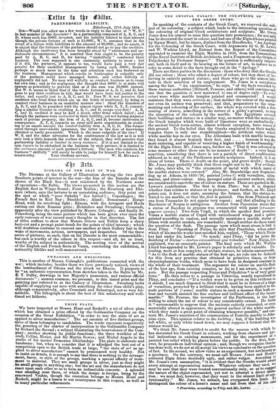- Ittttr to tot than.
PARTNERfSHIP LIABILITY.
Edinburgh, 17th July 1854. Sra—Would you allow me a few words in reply to the letter of W. S." in last number of the Spectator? In a partnership composed of A, B, C, and D, where each has 50001. invested, and his liability limited to that amount though the private fortune of each is 15,0001., W. S. assumes that in the event of a failure with liabilities to the amount of 60,0001., and no assets, it is unjust that the fortunes of the partners should not go to pay the creditors. Although the insolvency has been brought about by " unforeseen and un- fortunate circumstances," it is asserted that this ought to be the penalty paid by A, B, C, and D, for having " unskilfully " conducted their business. The case supposed is one eminently unlikely to occur ; but if it did, the partners,. it appears to me, would have paid a very fair penalty for their unskilful management by losing each 5000/., besides perhaps as much more in the time and attention each has bestowed on the business. Management which results in bankruptcy is culpable only if the partners could have managed better, and either wilfully or negligently did not. No man will wilfully so conduct business as to cause his own loss ; and as for negligence, the thought that 6000/. is at stake will operate as powerfully to prevent that as if the sum was 20,0001. instead. But W. S. seems to think that if the whole fortunes of A, B, C, and D, had j gone to pay their creditors in full, that would have been but justice to the latter, and equally just to A, B, C, and D. Does W. S. not perceive that creditors who trust firms which are on the brink of insolvency, by doing so conduct their business in an unskilful manner also ? Shall the blunders of A, B, C, and D, be punished with the utmost rigour while X, Y, Z, commit- ting a similar blunder in crediting A, B, C, and D, escape scot-free ? A, B, C, and D, credited it may be half a dozen other firms which failed ; and though the partners were unlimited in their liability, yet not having sixpence each of private property, the firm of A, B, C, and D, become insolvents in consequence. X, Y, Z, commits an error still more unpardonable in credit- ing to an unsafe amount the limited-liability firm A, B, C, D. The former erred through unavoidable ignorance, the latter in the face of knowledge obtained or easily procurable. Which is the more culpable of the two ? If W. S. and the other advocates for the continuance of the law as it is will only look a little beneath the surface of the subject, they will perceive that partnership liability is limited in every instance. If it is not limited to the sum known to be embarked in the business by each partner, it is limited to the unknown amount of each partner's fortune. The man Who conducts his business " skilfully " will surely be able to judge for himself how far each is
trustworthy. Your obedient servant, W. H. MURRAY.


































 Previous page
Previous page